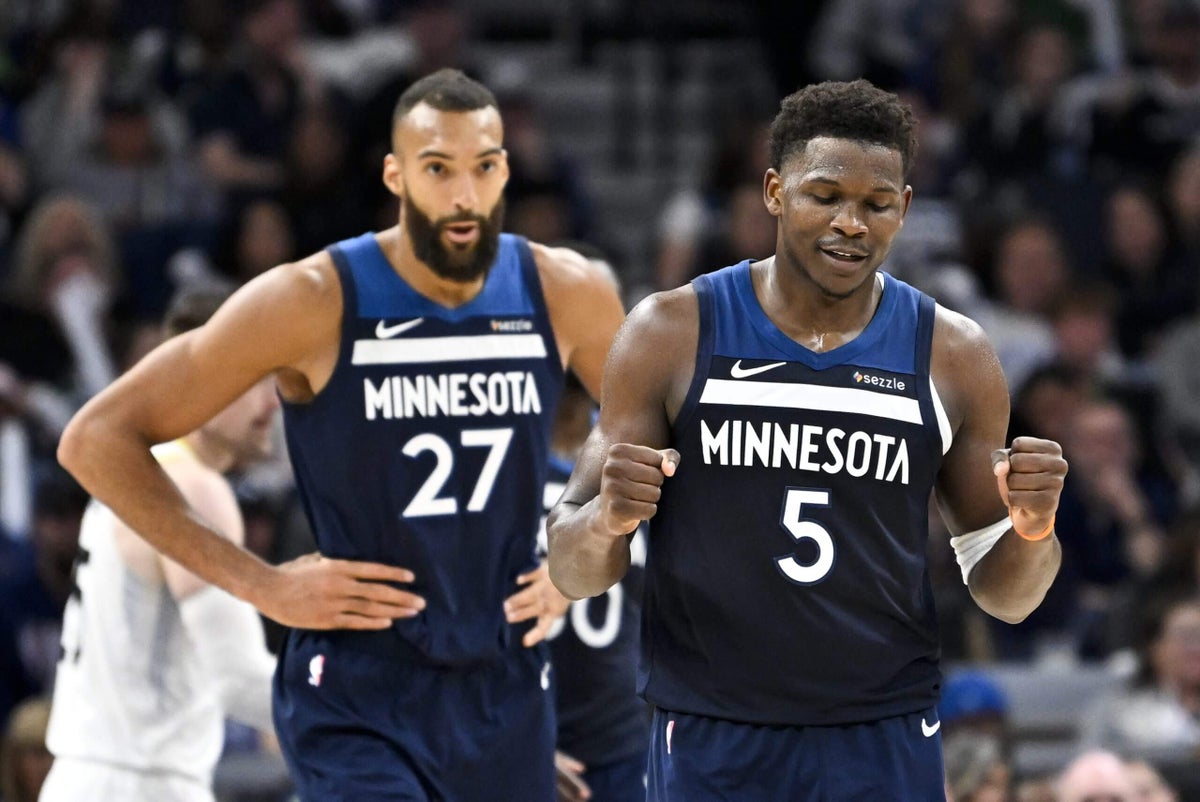

The visitors’ locker room at the Los Angeles Lakers’ arena is notoriously cramped. There is barely enough room for the team to move around in there, let alone when dozens of media members cram in for postgame interviews.
To make things easier on everyone, the Minnesota Timberwolves brought the most sought-after players to an interview room across the hall. After eliminating the Lakers in Game 5 on Wednesday night, Julius Randle, Anthony Edwards and Naz Reid sat at a table for a joint news conference.
Advertisement
Rudy Gobert was a little slower to get ready, so he did his interview alone. It was a fitting way for the night to end, with all of the attention on Gobert after the game of his life. He put up 27 points and 24 rebounds, becoming the first player with at least 25 points and 20 boards in a series-clinching win on the road since Shaquille O’Neal did it for Miami against the Chicago Bulls in 2006, per Timberwolves PR.
For Gobert, it was a satisfying breakout game after scoring just 14 points total in the previous four against the Lakers. For his teammates, who are well aware of the constant criticism he receives, it was even more cause for celebration. As he checked out of the game, they mobbed Gobert on the sideline, and he wore a wide smile of vindication.
“It feels great. We have a lot of guys that are underdogs,” Gobert said. “They’ve been underappreciated in their careers.”
No one has been more underappreciated than Gobert. He has won four Defensive Player of the Year awards but is constantly hounded by critics because of his offensive limitations. Luka Dončić’s shot over him in last season’s Western Conference finals was played on an endless loop heading into this series, and the belief that he would be played off the floor by the Lakers’ small lineup was a popular take.
But Gobert more than held his own against Dončić in isolation situations, and against the Lakers in general. Los Angeles did not start center Jaxson Hayes in Game 5, going exclusively with its preferred small lineup, and Gobert ate it up. In addition to his offensive explosion, which included eight dunks, the Wolves had a 97.9 defensive rating with him on the floor.
“That’s the Rudy that can win you championships,” Mike Conley Jr. said. “When you have that type of mentality to go get every rebound, go get every block, defend every guy at the rim, we needed that. He came at the biggest moment of our season.”
Advertisement
The Timberwolves are awaiting their second-round opponent. The Houston Rockets and Golden State Warriors play Game 7 of their first-round series on Sunday night. If the Rockets win, the Wolves will play Game 1 in Houston on Tuesday. If the Warriors win, the Wolves will host Golden State for Game 1 on Tuesday.
“I’m prepared for anything,” Gobert said after the Wolves resumed practicing on Saturday. “I think it’s more about my work and what I bring to the table for my team on both ends. In a playoff series, you’re going to have to adapt to whatever the other team might bring, so I’ll do my best to be ready for anything.”
While the Wolves wait, it is worth revisiting the emphatic, 4-1 wipeout of the Lakers and the themes that emerged.
Edwards wins the chess match
The series began with a challenge for Edwards. Could he rise to the occasion against a team and two star players who would test his ability to think about the game at a high level? Dončić and LeBron James are two of the smartest players in the league. Lakers coach JJ Redick had shown an ability in the regular season to develop effective game plans that changed depending on the opponent.
The Lakers wanted to neutralize Edwards’ explosiveness by throwing different looks at him, slowing him down by confusing him. It seemed to work in Game 2, when Edwards expressed bewilderment at the looks he saw.
“It seemed like every time I caught the ball, it kind of went like in a zone, in a sense,” Edwards said. “So it was kind of confusing at times. But we’ll watch film and be ready.”
He did. The two days off between games gave Edwards and the coaching staff time to dive deep into what he saw and find counters to the defense. He had one huge scoring night — 43 points in Game 4 — that everyone expected. The other three wins demanded a discipline and precision that weren’t always there for him in the regular season. He had 31 assists and only six turnovers in the series, and Game 5 was perhaps the biggest sign of his maturation.
Advertisement
Edwards shot the ball horribly, going just 5-of-19 from the field and 0-of-11 from 3-point range. But that did little to dull his impact. He had 11 rebounds, eight assists and three steals and was a plus-12 in 43 minutes. That ability to make a difference in other areas when his shot isn’t falling is going to be critical in the second round when they face an opponent that will have much more to throw at him from a defensive perspective.
Edwards credits film work with Chris Hines, the head of player development on Chris Finch’s staff, for helping him understand how to exploit weaknesses in any defense thrown at him.
“The thing about watching film is you got to be willing to accept the bad. I think most people, they only want to watch it when it’s good,” Edwards said.
Finch wins the day
The Lakers are a flawed team, with defensive deficiencies on the perimeter and at the rim, lack of a real center and a bench so thin Redick felt forced to play five players for the entire second half of Game 4. But the Wolves also had a decided edge in coaching with Finch, who has led the Wolves to the playoffs in all four of his full seasons on the job, against the rookie Redick.
For the second year in a row, Finch had his team ready to roll right from the start after getting a week to prepare for his opponent. The Wolves drilled the Lakers in Game 1 in Los Angeles, a testament to the scouting and game planning the coaching staff was able to do with the team in the run-up to the game.
The Wolves swept the Suns in the first round last season, looking like the more prepared, better-educated team. The Lakers series lasted one more game, and three of the four victories were close on the scoreboard. But by the end of the series, the separation was clear.
Redick had fewer levers to pull with the Lakers, but his gamble to play five players without resting them in the second half of Game 4 flopped when the Lakers ran out of gas in the fourth quarter and surrendered a 10-point lead. He also played Maxi Kleber in Game 5, putting him on the floor for the first time since he had foot surgery in January while with the Dallas Mavericks. It was a desperate move by a desperate coach, and Finch was ready for it.
Advertisement
After eliminating the Lakers, Finch was as fired up as he has been all season. This has been a trying year. It took him a long time to find the identity of the team following the trade of Karl-Anthony Towns for Randle and Donte DiVincenzo. Finch faced scrutiny for his rotation decisions, his unwillingness to play young players more and the team’s struggles in clutch situations.
Sure, this Lakers team had holes. But any time you take down Luka and LeBron in a series in such decisive fashion, it is an achievement. This is also the first time the Timberwolves have advanced to the second round in back-to-back years in franchise history.
“Certainly very proud of the accomplishment that we’ve had in the last two years and in our entire time here,” Finch said. “I have the most outstanding staff, super intelligent, I mean, game plan that they put together for this series was spot on and easily conveyed to our guys, and they executed it to a high level.”
Conley comes through
This was supposed to be a series that would leave Conley behind. The Lakers were too big for him, and many believed it was only a matter of time before Finch went to DiVincenzo in the starting lineup, like he did for five games in January before he injured his toe.
Conley only shot 35.7 percent from the field and 29.4 percent from 3-point range in the series. He averaged 5.6 points per game and didn’t score at all in the Game 2 loss. But every time it looked like Conley might be on the verge of playing himself out of a game, he would make a big play to swing it back in the other direction.
He blocked James’ shot in Game 4, waking the Wolves up after allowing an 11-0 start to the third quarter. He had another contest that thwarted James in Game 5, but it was not counted as a block. And in a game where the Wolves missed 40 3-pointers, Conley coolly knocked down one from the corner with 1:22 left to ice the game for Minnesota.
“Mike fought his tail off in this series,” Finch said. “It was really hard for him to get in kind of any rhythm offensively. He had a lot of good looks early in the game. But if there’s a guy who’s got nerves of steel, makes big shots — and he’s made a ton of them for us — it’s going to be Mike.”
(Photo of Rudy Gobert and Anthony Edwards: Stephen Maturen/Getty Images)
This news was originally published on this post .




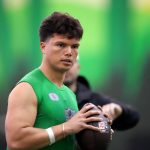
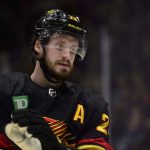
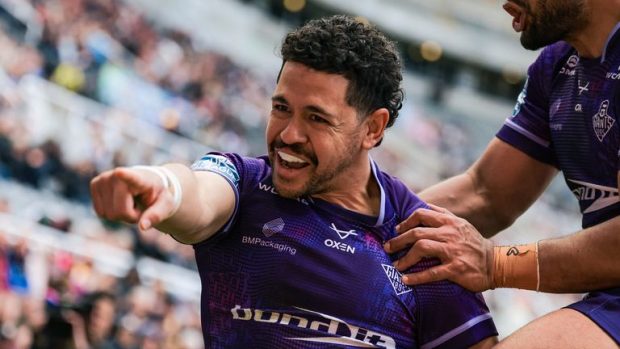

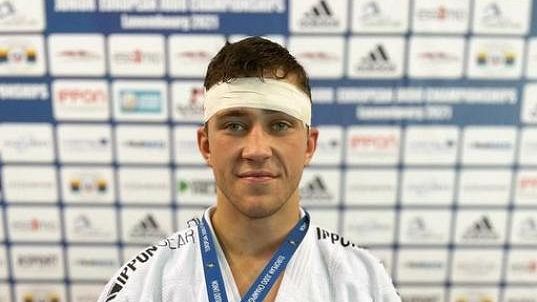
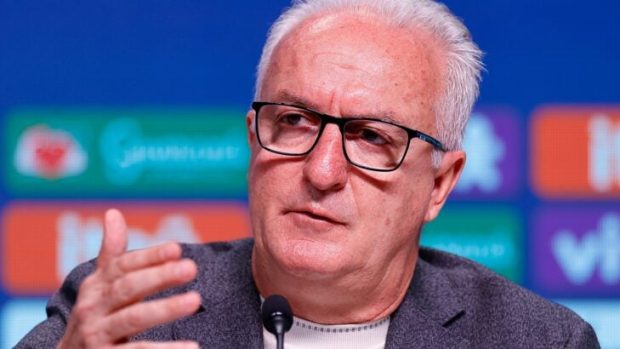
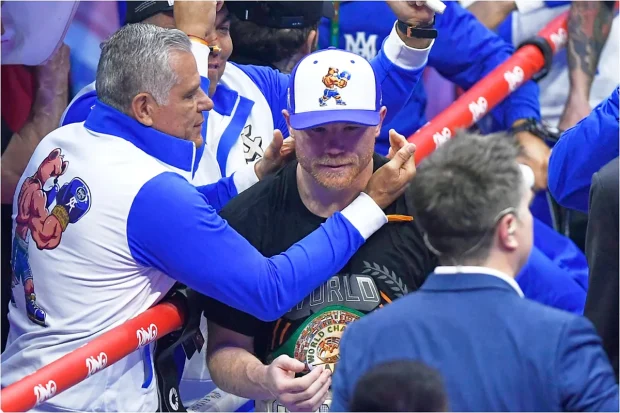
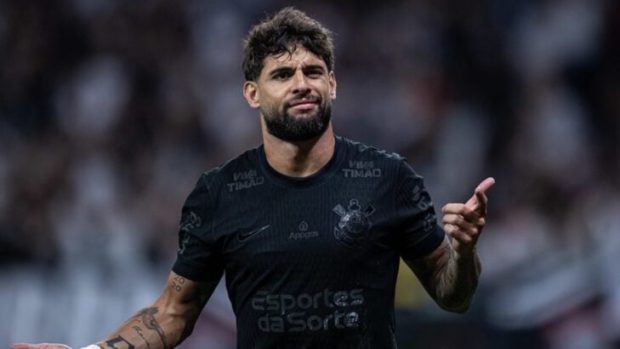
Be the first to leave a comment